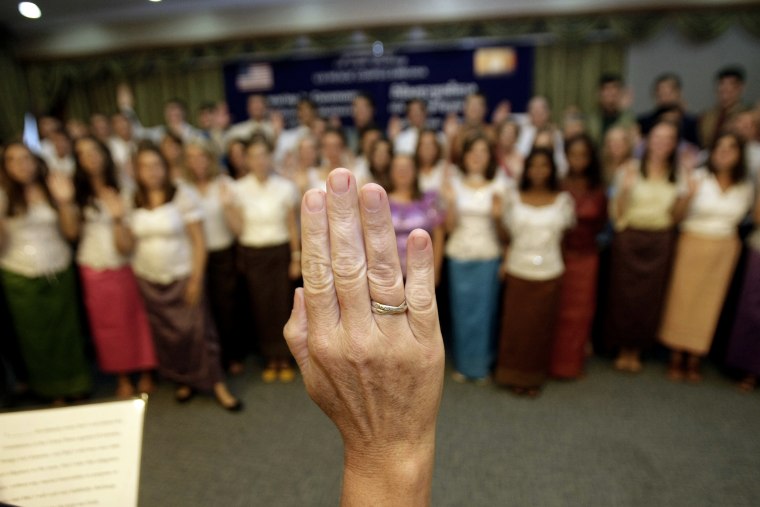When Christine Carcano found out she had become pregnant as a result of being raped in Peru, her challenges were far from over. She chose to have an abortion, but learned her insurance coverage wouldn't pay for it -- and it cost more than a month's salary.
That's because Carcano was a Peace Corps volunteer. Federal coverage of abortion is already extremely limited, and every dollar is fraught with politics. But federal insurance plans will cover abortion in cases of rape, incest and life endangerment for government employees, people on Medicaid, residents of the District of Columbia and, most recently, military service members. By contrast, the coverage ban for Peace Corps volunteers, in place since 1979, is absolute.
Carcano, who hadn't yet told her family about her ordeal at the time she sought an abortion, eventually got financial help from a friend's mother. But she and other advocates and former Peace Corps volunteers are pushing for a more lasting and equitable fix: The Peace Corps Equity Act, first introduced by the late Senator Frank Lautenberg (D-N.J.), that would close the gap.
Rounding out the campaign is a new report, “No Exceptions: Documenting the Abortion Experiences of U.S. Peace Corps Volunteers,” drawn from interviews with over 430 Peace Corps volunteers and prepared by a team from the University of Ottawa and Princeton University.
About 215,000 Americans have served as Peace Corps volunteers since the program was established in 1961. These days, 63% of Peace Corps volunteers are female, and the average age they begin volunteering is 28. They live on a stipend of only around $250-$300 a month. According to the Guttmacher Institute, in 2009 the average cost of a first-trimester abortion was $470.
Before the coverage ban went into effect in 1979, as part of a wave of federal funding bans in the wake of Roe v. Wade, abortion for Peace Corps employees was covered like any other medical procedure. By the mid-1980s, with the anti-abortion movement in full swing, one Peace Corps volunteer who sought an abortion recalled hearing at the agency’s office, “We’re sorry to tell you, but Reagan is the president right now and we can’t touch this with a ten foot pole.” They handed her a phone book; her parents paid for the abortion.
The report quotes another volunteer, who was raped in South Asia, saying that when she learned she was pregnant, “I thought, I don’t want to spend the rest of my life feeling like I want to claw the skin off my body.” Her friend’s parents gave her the money for an abortion.
“Why are we penalizing one group of women for choosing [to serve] our government through Peace Corps? Why are we penalizing them by failing to give them adequate services in the event they [are] raped?” the volunteer said.
President Barack Obama's proposed 2015 budget includes closing the coverage gap, but the same provision didn't survive last year's budget process. A more lasting solution would be the Peace Corps Equity Act, which will be re-introduced by Senator Jeanne Shaheen (D-N.H.), who managed to eke out a similar win on abortion coverage for service members in case of rape.
“Extending basic reproductive health care services to female Peace Corps volunteers is long overdue,” Shaheen said in a statement. “Peace Corps volunteers face inherent risks living and working abroad. There’s no reason they should be denied standard health care services offered to most women with federal health care coverage.”
Representative Nita Lowey is introducing the bill in the House. “This is about fairness – fairness for American ambassadors working in every corner of the world to save and change lives," Lowey said.
It’s likely that the overall number of women who would benefit from the proposed policy fix is small. Of the 433 interviewees in the "No Exceptions" report, thirty-two, or 8.8%, reported they had been raped or sexually assaulted during their service. (Respondents volunteered for the survey via various Peace Corps networks and thus aren't necessarily a representative sample.) Three women became pregnant as a result of their assaults and chose to have an abortion at their own expense.
When it comes to the federal government and coverage of abortion, incremental advances and closing gaps are the best advocates can hope for -- a dogged and slow attempt to reverse the segregation of abortion from other medical services. And as the report points out, symbolic victories matter too. It would, the authors wrote, “be perceived by most of the [returned Peace Corps volunteers] in our study as an acknowledgment by the federal government that their service is valued.”
